Forests, Trees and Peeling Paint
- August 8th, 2014
- Write comment
How do people see you and the world around you? There was an interesting day recently when I was pondering that very thing due to several interactions I had with people in different contexts, all of them related to photography. The right combination of moments all conspired together all in one day to give me a different appreciation of just how differently people can see the same world. Not only how they see what is around them, but how it is sometimes difficult to see it outside their own perspective
A thing I have learned after years of attempted photography is that people perceive you differently when you are holding what they consider a “real” camera and related equipment. I suppose it is one of those collectively learned reactions that is spawned from generations of ingrained association of big cameras with some sort of media outlet. But even without a “PRESS” card tucked under the band of your rumpled, felt fedora, there is an undeniable reaction that a lot of people have to seeing someone carrying a big hunk of photographic equipment. Sometimes that reaction is simply an extra glance or two your way, other times it is a cautious stare. Whether the thought going across their mind at the time is, “Ooo, I wonder who he is photographing for!” or, “Who does this guy think he is?!”, is a little hard to tell. Quite often though, people tend to feel the need to acknowledge further.
“Gettin’ some good shots?” is by far the number one friendly ice breaker. I never really know what to say to this question. Do they really want to hear me discuss the how the glare right now is messing with my ability to see the correct focal point quickly, causing me to delay every shot a moment or two while I compensate, thus missing the perfect shot by a couple milliseconds? And, on top of that, did they also want to know that I forgot my extra battery so right now I’m not even checking the display, which means I am rationing my shutter clicks because I know at any moment, nothing will happen when I press the button? I am quite sure that is not what they want. What is a good shot anyway? I could scroll with you through the 300 I just took and say “I guess I like this one … so yes I got one good shot”. But that isn’t really what they are looking for either. Most of the time, I think people just want to acknowledge that they see you, and see what you are doing. Sometimes, even want to feel a part of it. They just don’t know how to express that feeling. I have yet to hear “Camera huh? Is it yours?” But I don’t think I would be surprised if I do sometime. I feel as though I understand that feeling of wanting to be involved, so as much as possible I try to respond in kind, but be brief. My typical response to the “good shots” question is as much of a warm smile as I can manage and “Oh, I’m tryin’!” followed by a comment on the weather, or the event, or how many people there are around, or how pretty the sunset is tonight. At that point both parties are usually satisfied with their level of involvement, and I go on about my business.
So that brings up another thing I have learned. If you want to meet new people, walk around carrying a big camera. I don’t care if you don’t even know how to use it, people will talk to you out of the blue and assume you really know what you are doing, or at least are doing something really important. For an extreme introvert like myself, this can be a little bit terrifying, and for the highly self-critical amateur photographer in me, this can be, well … even more terrifying. It would be rather nice to be paid by the number of times I heard “Are you with the paper?”. It wouldn’t make me rich, but I could probably buy a fairly decent lens! I have never said, “Yes” to those questions, but I’m sure people would be quite chatty if I did.
If there isn’t a connection to the paper or to National Geographic, I think that occasionally people have a hard time computing what you could possibly be spending time taking pictures of. Sometimes I imagine the thought process of someone trying to work out the object of my camera’s attention. There is nothing obvious that indicates the cave-man-ish “I was here” in your shot, you aren’t pointing at people, that certainly isn’t food and you are focusing way too intently. What could possibly be that cool?
My wife and I were exploring some towns and sights in Northern Michigan when I had my full day of illuminating interactions. For the first encounter on my interesting day I found myself standing along the edge of a quiet street, looking at how the sand from the beach of nearby Lake Michigan glistened in the sun as it laid in stark contrast against the slowly melting black asphalt. I followed the edge of the street looking at the different formations of the grains of sand and I came upon a iron manhole cover. The sand had piled up a little along its edge and I thought this was the perfect setup for a black and white photo. I swung my camera around and moved in to find the perfect angle, adjusting my height up and down, focusing, snapping a few shots. While I was snapping away, out of the corner of my ear I heard footsteps crunching the gravel on the asphalt as a man crossed the street a dozen yards away. I glanced up and he bellowed “Did you lose your keys?” 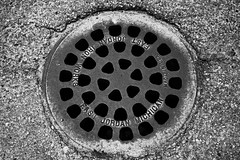 It was a bit comical, but I really didn’t know how to reply with anything other than the obvious. “No,” I chuckled, “just taking some pictures.” Did I really look like I was looking for my keys? I wondered a moment or two just how I might be conveying that scenario since I wasn’t standing near a car and had a camera pressed up to my face. Perhaps this was something he had experienced in the past. Maybe I did drop my keys and not notice, I actually even checked to see if there was a hole in my pocket that might have made it look like I dropped my keys. Nope … keys still there. He smiled and shuffled on, and I went back to my sandy manhole.
It was a bit comical, but I really didn’t know how to reply with anything other than the obvious. “No,” I chuckled, “just taking some pictures.” Did I really look like I was looking for my keys? I wondered a moment or two just how I might be conveying that scenario since I wasn’t standing near a car and had a camera pressed up to my face. Perhaps this was something he had experienced in the past. Maybe I did drop my keys and not notice, I actually even checked to see if there was a hole in my pocket that might have made it look like I dropped my keys. Nope … keys still there. He smiled and shuffled on, and I went back to my sandy manhole.
A couple hours later, I was walking through an area of the sleepy town that was adorned with several quaint shops, the kind that have been standing since your grandfather was born. Over the years their different owners have come and gone, and they used to sell grain or lumber, until people stopped buying those things and wanted T-shirts and coffee mugs instead. I found one shop that stood two stories tall near a giant shade tree. A small flower garden nearby was being tended by a thin, greying lady who was arranging some petunias closer to the store entrance. An electronic ding-dong sounded from a device clipped to her pants pocket and she hustled from the garden to greet the new customers just walking into the front door. As she passed by me I smiled at her and she cheerfully said, “Hello, nice day today!”
I wandered the flower garden for a minute or two, camera at the ready. But, I kept looking at the shop itself and how majestically old it appeared. The recent coat of yellow paint glinted brightly in the sun, but there were areas where you could see decades of paint jobs chipped away down to the siding. Standing at the right angle, you could see small sections of the paint peeling away and hanging down in gentle curls away from the straight lines of clapboard. Zooming in with my lens, I focused on finding curly rinds of yellow paint and I started snapping a few shots. 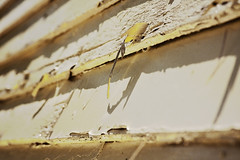 The shopkeeper came back out of the store to tend the garden again, but she stopped nearby and tried to focus on what I was photographing. “What kind of pictures are you taking?” she asked, seeming a bit bewildered. “Oh, I’m taking a few shots of the paint peels up on the siding.” As soon as I said that, I thought that it sounded a bit odd. “Oh,” she said shaking her head a little bit, “they’re supposed to be scraping that all away and painting it right.” She commented as she walked towards the garden “It was supposed be done this spring, but they didn’t do it again. Who knows, maybe it costs too much, I don’t think they’ll be painting again this year.” Clearly she got the wrong idea of why I was taking the picture. I thought what I saw was beauty, but that seemed too difficult to explain successfully in the moment.
The shopkeeper came back out of the store to tend the garden again, but she stopped nearby and tried to focus on what I was photographing. “What kind of pictures are you taking?” she asked, seeming a bit bewildered. “Oh, I’m taking a few shots of the paint peels up on the siding.” As soon as I said that, I thought that it sounded a bit odd. “Oh,” she said shaking her head a little bit, “they’re supposed to be scraping that all away and painting it right.” She commented as she walked towards the garden “It was supposed be done this spring, but they didn’t do it again. Who knows, maybe it costs too much, I don’t think they’ll be painting again this year.” Clearly she got the wrong idea of why I was taking the picture. I thought what I saw was beauty, but that seemed too difficult to explain successfully in the moment.
In another town, we made our way to the beach as the sun was starting to hang low in the western sky. Scores of people were standing and watching the sun slowly slip between the clouds and behind a silvery, glistening  stretch of Lake Michigan. I started hauling my gear out of the car and made my way down to the water to capture the silhouettes of figures walking across the concrete breakwater at the mouth of the harbor. I snapped dozens of shots, attempting to catch the intense orange glow beaming from behind the dark figures. The sun was setting quickly, so I did not linger. I slung my camera bag over my back, propped my tripod on my shoulder and started briskly walking down the deserted, thin strip of beach between the tall beach grass and the cool lake waves.
stretch of Lake Michigan. I started hauling my gear out of the car and made my way down to the water to capture the silhouettes of figures walking across the concrete breakwater at the mouth of the harbor. I snapped dozens of shots, attempting to catch the intense orange glow beaming from behind the dark figures. The sun was setting quickly, so I did not linger. I slung my camera bag over my back, propped my tripod on my shoulder and started briskly walking down the deserted, thin strip of beach between the tall beach grass and the cool lake waves.
Glancing up a few minutes into my walk, I saw a couple sitting in beach chairs at the edge of the beach grass ahead of me that I had not noticed previously. They were facing towards the disappearing sun with its orange aura happily reflecting off their skin. There were barely three feet of sand between the waves and their beach chairs, and I’d be walking right in front of their glowy entertainment … interaction was inevitable! I scrolled through a few things that might be said, but I didn’t have much time until I was right in front of them. “‘Scuse me,” I tried to say in a way that implied an attempt at being as unobtrusive as possible, as if somehow on command my body suddenly became a bit more transparent. “Gettin’ some good shots?!” came the familiar greeting. “Oh, I’m tryin’!”, I replied to the man without even thinking, “it’s a great night isn’t it?” I glanced over without breaking my stride. I saw him point enthusiastically at the sinking sun, “I’m guessing you saw that?!” I chuckled a little and replied “It’s a little hard to miss tonight eh? Very pretty!”
My destination was a small beacon structure on the very end of the concrete breakwater at the mouth of the harbor. From this point I could frame the distant lighthouse against the backdrop of the sunset and maybe catch some passing boat traffic at the same time. I set up my tripod and framed the scene, then just waited for the sun to set a little further and hopefully not be obscured by the thick, stormy clouds at the edge of the horizon. As I waited, I could hear the low rumble of slow-trolling boats coming up the narrow waterway to make their way onto the lake. They are required to move very slowly in this section of the harbor, so slowly that I was picking up on the conversation that two boat owners were having as they converged, heading in the same direction. They amicably quizzed each other on their vitals for the few minutes they had in each other’s relative company. “What year is yours?”, “What’s her horsepower?” and “When did you first get the bug?” Questions and answers that I couldn’t relate to, but both captains used as shorthand to become fast friends in passing. They parted ways after a few moments with a “Good Luck” and a friendly wave.
One of the boats was turning towards my camera’s field of view fifty yards out. The captain was barely visible on the deck through the dusk of evening as he floated by, but I could see we made something akin to eye contact. He waved to me cheerfully and I waved back. “Am I going to ruin your shot?” he hollered to me across the water.  This was new! I have had people do all sorts of strange things to get out of my way, or completely ignore me and get in my way, when they see me shooting (usually, they do the exact opposite of what you hope they will, but that is another story). I had never actually had a vehicle of any sort offer to literally change course for one of my shots. “No not at all,” I hollered back. “Go right on ahead!” The boat glided beautifully into frame between the lighthouse and the horizon, as he floated by I fired off several “ruined” shots.
This was new! I have had people do all sorts of strange things to get out of my way, or completely ignore me and get in my way, when they see me shooting (usually, they do the exact opposite of what you hope they will, but that is another story). I had never actually had a vehicle of any sort offer to literally change course for one of my shots. “No not at all,” I hollered back. “Go right on ahead!” The boat glided beautifully into frame between the lighthouse and the horizon, as he floated by I fired off several “ruined” shots.
Earlier the same day, we were driving through a vast park with gorgeous open spaces punctuated by majestic expanses of trees. I was driving, but still watching the sides of the road to soak in as much of the scenery as I could. We passed by a large stretch of pine trees and I slowed the car suddenly, coming to a stop on the gravel-strewn shoulder as I flipped on the hazards. I checked the rearview and saw no cars, so I hopped out and grabbed my camera gear. I tossed a casual “I’ll just be a couple minutes” to my wife and I waded into the waist-high grass at the side of the road. I stood a few yards off the road, assessing the view. I took a few shots, crouched down and took a few more. I could hear a car approaching, slowing down, slowing more and passing by our car at a crawl. Glancing over my shoulder I could clearly see the passenger’s curiosity as to what I had found. Another two cars repeated the maneuver as I snapped away.
Another car approached and slowed noticeably, coming to a stop right behind me. Taking another look over my shoulder I was greeted by four curious faces. The passenger window rolled down and a young man hanging over the side. “What do you see?!” He asked in somewhat of a shouted whisper of excitement. “Oh! Just trees!” I replied enthusiastically. The look on his face was a bit hard to describe. A combination of disappointed, bewilderment and a dash of annoyance. He sat back in his seat a little as he said, “Oh, OK”. For some reason, when I saw that reaction, I felt the need to say, “Sorry.” They hesitated a moment or two, then the window rolled up, the car drove away, and I went back to my treeful forest.
Although the chronology is ever so slightly skewed via artistic license, this 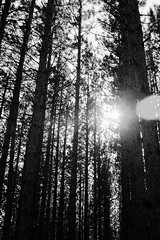 episode completed my interesting day full of perspectives on the world. I don’t quite know how to most effectively bend the “forest for the trees” cliche to fit my experience that day, but I think if I tried, it wouldn’t quite match the uniqueness of what actually happened. Why did I say sorry to that young man? Part of me was sad about his disappointment in not experiencing the exciting thing that he imagined was out there. Part was also sad that I assumed that he wouldn’t have the same level of excitement or appreciation for the beauty I saw in the trees just standing against the light. Later, I was mostly sad because I assumed correctly, he couldn’t see it, at least not in the moment. I like to think that as they drove away, maybe from a different angle, he saw what I saw.
episode completed my interesting day full of perspectives on the world. I don’t quite know how to most effectively bend the “forest for the trees” cliche to fit my experience that day, but I think if I tried, it wouldn’t quite match the uniqueness of what actually happened. Why did I say sorry to that young man? Part of me was sad about his disappointment in not experiencing the exciting thing that he imagined was out there. Part was also sad that I assumed that he wouldn’t have the same level of excitement or appreciation for the beauty I saw in the trees just standing against the light. Later, I was mostly sad because I assumed correctly, he couldn’t see it, at least not in the moment. I like to think that as they drove away, maybe from a different angle, he saw what I saw.
The beauty in those trees, that boat, that paint, that sand, it is there for everyone to see, they just need to be seen differently.
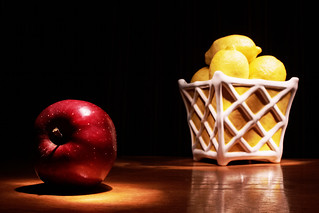
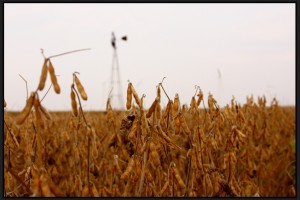
 RSS - Posts
RSS - Posts